Over the last year, 24% of citizens actively participated in the lives of their communities and 15% joined activities of civil society organizations. Lack of interest is no longer a critical reason for non-participation. 72% of Ukrainian citizens donated money towards the resistance against Russia’s aggression and 59% volunteered for the army, IDPs’ or other war victims’ needs. 64% of Ukrainians believe that corruption can never be justified, and nearly 80% declare readiness to join anti-corruption activities on a local and national levels. According to Ukrainians, tackling corruption tops other post-war priorities for the government, such as strengthening defense capabilities or rebuilding infrastructure. Pact presents these and other key findings of the 10th round of the Civic Engagement Poll, conducted in summer 2022 under the USAID/ENGAGE Activity.
Civic Engagement
ENGAGE data shows that while Ukrainians continue to be more actively engaged in the life of their communities than in the activities of civil society organizations (CSOs), there is a surge in civic engagement in both areas. The number of those who cite lack of interest as a reason for non-participation has dropped significantly. A sweeping majority of citizens is aware of different forms of democratic participation on local and national levels, and the number of those who actually used those avenues has increased compared to the previous year.
The number of Ukrainians who report to be actively engaged in the life of their communities surged from 7% in September 2021 to 24% in August 2022. Another 36% of citizens joined community events rarely, compared to the previously reported 29%. While the lack of time continues to be the major obstacle for community-level engagement (24%), the lack of interest as a reason for non-participation has dropped from 30% in 2021 to 9% in 2022.
Participation in CSO activities has also seen an unprecedented growth. 15% of respondents say they actively join the activities of civic organizations vs 4% in September 2021, while 32% are engaged rarely (29% in 2021). At the same time, less people claimed that they do not participate because they don’t have interest (12% vs 41% in 2021). Lack of trust might be the issue that overshadows public engagement as 45% say that CSOs are not trustworthy.
Ukrainians are aware of the forms of democratic participation: 70% know about participation in a peaceful assembly for a specific cause, 68% are aware of initiation or signing electronic petitions to the city mayor, district, regional council, or the President, 63% know about reports on corruption cases to the Prosecutor’s office or the police, and about reports to local authorities on a damaged road and other infrastructure issues.
Initiation or signing electronic petitions to the local or national government tops the list of activities Ukrainians were most engaged in – 26% claim they did so in the last 12 months compared to 5% in 2021. Another 26% participated in a peaceful rally – this figure increased fourfold compared to 2021. While 13% reported on damaged infrastructure, 3% of Ukrainians flagged corruption cases to the law enforcement bodies (6% and 1% in 2021 respectively). Lack of time (22%), physical condition, work or study (14%) and caring for family (12%) are top three cited hurdles for the exercise of active citizenship.
Wartime Activism
The results of the Civic Engagement Poll confirm ubiquitous mobilization of citizens in the face of Russia’s unprovoked and unjustified invasion of Ukraine: the levels of awareness of and participation in the activities related to repelling the aggression are considerably higher compared to peacetime civic engagement.
92% of respondents are aware of possibilities to join a volunteer movement to support the army, IDPs, or other war victims’ needs. Roughly the same share (91%) knows about possibilities for donating money to support resistance to Russia’s aggression or to tackling its consequences. 71% are aware of ways to report on enemy movements and the whereabouts of collaborators.
Engagement in these activities largely exceeds participation on the community level or in CSOs’ activities: 72% of respondents donated funds to support the resistance and 59% participated in volunteering activities. When it comes to specific areas of wartime engagement, 41% of Ukrainians supported IDPs at shelters or provided free housing, 40% procured various goods for army needs and 21% were involved in information resistance. 14% of respondents were involved in evacuation of civilians from endangered areas and 7% volunteered as professionals (doctors, teachers, psychologists, etc.) 10% joined military or territorial defense units and 8% reported on enemy movement or collaborators.
Army needs became the primary purpose of all donations that Ukrainians made since the beginning of the war (65%). 56% donated towards humanitarian aid for those affected by the war while 48% donated to charitable initiatives.
Attitude to Corruption
ENGAGE data indicates a fundamental shift in citizens’ perception of corruption and their determination to root it out. Arguably, the war awoke an acute demand for justice on one hand and made corruption more intolerable than before on the other. While less citizens have faced corruption compared to last year and almost no one reported on corrupt practices to authorities, significantly more Ukrainians claim that they are ready to act against corruption.
Eradicating corruption is among top post-war priorities for the government, according to 36% of respondents. Even such issues as repairing of infrastructure (30%), strengthening defense capabilities (30%) or lustration and prosecution of collaborators (28%) or dealing with the economic crisis (19%) legged behind.
Compared to September 2021, a share of those who think that corruption can never be justified rose steeply from 40% to 64%. People vest the same responsibility for bribery on both bribe givers and bribe takers (87% vs 65% in 2021). Meanwhile, less citizens believe that they will be denied access to critical state services such as medical care or higher education if they don’t pay a bribe (31% vs 49% in 2021).
Compared with 2021, the share of those who are ready to join collective protests against corrupt officials on national and local levels grew twofold (78% vs 40%; 81% vs 42% respectively). Readiness to report corruption cases grew to 84% from 44% in September 2021. Despite these stronger perceptions, only 4% have publicly protested corruption or reported on it in the last 12 months.
Corruption became less widespread according to Ukrainians – 34% of respondents claim that they or their family members faced it (compared to 49% in 2021). 29% are certain that the corruption rate has decreased over the last 12 months, while almost half think that it remained the same (48%).
Ukrainians’ opinion on the government’s effectiveness in tackling corruption is also improving. One-third (31%) think that the government is rather or very effective (5% in 2021). According to respondents, anticorruption authorities play the biggest role in countering corruption (35% vs 40% in 2021), while every third Ukrainian thinks that such responsibility lies with average citizens (32% vs 22% in 2021).
Citizens and the State
Ukrainians demonstrate balanced expectations from the state and themselves when it comes to their and their families’ safety. Overwhelming majority of citizens intend to remain in their local communities in the near future. Active participation in resisting the enemy and volunteering is as important as observing classic citizens’ duties.
22% of Ukrainians expect the state to be responsible for their and their families’ safety, while 27% rely on themselves. Almost half (49%) of respondents expect this responsibility to be shared between them and the government.
In the near future, 87% of Ukrainians intend to remain in their local communities. 7% would like to relocate within Ukraine, and 5% consider moving abroad.
When asked to describe a good citizen, Ukrainians’ answers reflect the reality of the wartime. A good citizen always observes the law (97%) and pays taxes (95%). A good citizen is fully aware of their rights and able to defend them (95%). Equal shares think that a good citizen should be actively involved in resisting the enemy – informing about enemy movement, whereabouts, or collaborators (94%), volunteering for army or IDPs’ needs (91%) and donating to military or volunteers (90%).
__________________________________
This survey summary was prepared by Pact as part of the USAID/ENGAGE activity, which is funded by the United States Agency for International Development (USAID). The contents of this survey summary are the sole responsibility of Pact and do not necessarily reflect the views of USAID or the United States Government.
About the CEP
The Civic Engagement Poll is conducted under the framework of the Enhance Non-Governmental Actors and Grassroots Engagement activity (USAID/ENGAGE), implemented by Pact. This report summarizes key takeaways from the poll, drawing from survey data collected in the summer of 2022.
The Civic Engagement Poll is conducted bi-annually since 2018 and gauges citizen awareness of and engagement in civil society activities, and citizens’ participation in and perception of reform processes in Ukraine. During the most recent survey, respondents were also asked questions about their involvement in resisting Russia’s aggression.
Data collection for the USAID/ENGAGE Civic Engagement Poll was performed by the research agency Info Sapiens during July-August 2022. Due to Russia’s war, the survey was conducted using a method of telephone interviews (CATI). Instead of a multi-stage stratified sampling with quotas that was used in previous CEP surveys, random digit dial (RDD) with quota tracking was used for the final stage of telephone interviews. While the war has changed the structure of the adult population of Ukraine, the selected telephone interview method allows to follow the trends in indicators’ change and compare data with previous surveys.
Telephone interviews were conducted with Ukrainian citizens aged 18 years and older. The survey sampled 2,024 respondents and was designed in accordance with the distribution of the adult population of Ukraine by age, sex, oblast, and settlement type according to the data of the State Statistics Service of Ukraine as of January 1, 2019 (excluding Crimea and non-government controlled areas of the Donetsk and Luhansk Oblasts). The margin of error of the sample is 2.2% (excluding the design effect).
To dig deeper into CEP data, you can request a full 2017-2022 dataset via ukraineengage@pactworld.org. Please provide information about your organization and position and the purpose you would like to obtain the files


